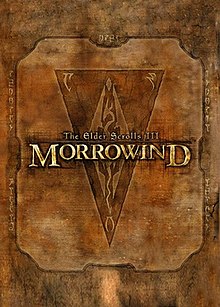| The Elder Scrolls III: Morrowind | |
|---|---|
 | |
| Developer(s) | Bethesda Game Studios |
| Publisher(s) | |
| Director(s) | Todd Howard |
| Designer(s) | Ken Rolston |
| Programmer(s) | Craig Walton |
| Artist(s) | Matthew Carofano |
| Writer(s) |
|
| Composer(s) | Jeremy Soule |
| Series | The Elder Scrolls |
| Engine | NetImmerse |
| Platform(s) | |
| Release | Microsoft WindowsXbox |
| Genre(s) | Action role-playing |
| Mode(s) | Single-player |
The Elder Scrolls III: Morrowind is a 2002 action role-playing game developed by Bethesda Game Studios and published by Bethesda Softworks. It is the third installment in The Elder Scrolls series, following 1996's The Elder Scrolls II: Daggerfall, and was released for Microsoft Windows and Xbox. The main story takes place on Vvardenfell, an island in the Dunmer (Dark Elf) province of Morrowind, part of the continent of Tamriel. The central quests concern the demigod Dagoth Ur, housed within the volcanic Red Mountain, who seeks to gain power and break Morrowind free from Imperial reign.[1][2][3]
Though primarily a fantasy game, with many gameplay elements and Western medieval and fantasy fiction tropes inspired by Dungeons & Dragons and previous role-playing games, Morrowind also features some steampunk elements, and drew much inspiration from Middle Eastern and South Asian cultures. Morrowind was designed with an open-ended, freeform style of gameplay in mind, with less of an emphasis on the main plot than its predecessors. This choice received mixed reactions, though such feelings were tempered by reviewers' appreciation of Morrowind's expansive, detailed game world.
Morrowind achieved critical and commercial success, winning various awards including Game of the Year and selling over four million copies worldwide by 2005.[4] It has since been considered one of the best video games ever made. The game spawned two expansion packs: Tribunal and Bloodmoon. Both were repackaged into a full set (along with several minor add-ons) and titled Morrowind: Game of the Year Edition, which was released in October 2003.[5] Morrowind was followed by The Elder Scrolls IV: Oblivion in 2006.
- ^ "Intro to Morrowind". The Elder Scrolls III: Morrowind. Bethesda Softworks. Archived from the original on September 29, 2019. Retrieved October 18, 2010 – via The Imperial Library.
- ^ "The Story of Morrowind". The Elder Scrolls III: Morrowind. Bethesda Softworks. Archived from the original on February 11, 2020. Retrieved October 18, 2010 – via The Imperial Library.
- ^ "Dagoth Ur's Plans". The Elder Scrolls III: Morrowind. Bethesda Softworks. May 1, 2002. Archived from the original on January 25, 2020. Retrieved October 18, 2010 – via The Imperial Library.
- ^ "Lynda Carter Joins the Voice Cast of The Elder Scrolls IV: Oblivion". ElderScrolls.com. Bethesda Softworks. August 17, 2005. Archived from the original on July 10, 2010. Retrieved November 26, 2006.
- ^ Cite error: The named reference
GOTYSHIPSwas invoked but never defined (see the help page).